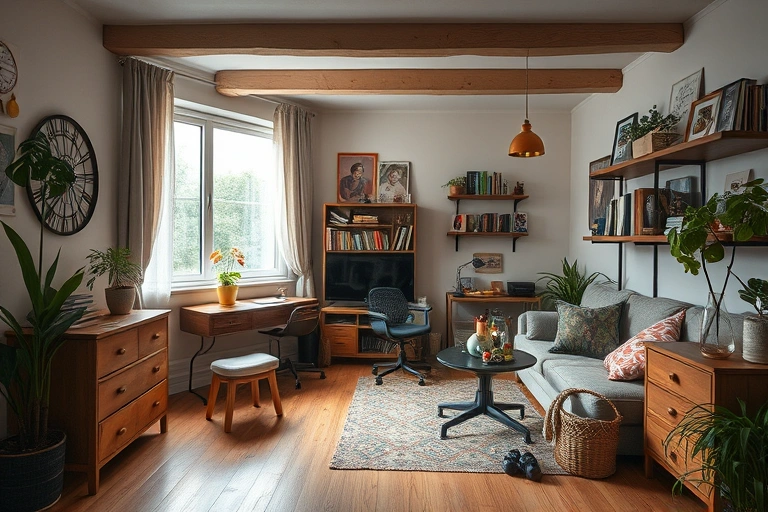House Hacking: How to Live for Free
Introdução
House hacking is an innovative approach to real estate investment that allows homeowners to significantly reduce their living expenses, or even live for free. By utilizing available space in their homes, individuals can generate rental income that offsets their mortgage payments or other housing costs. This strategy has gained popularity, especially among millennials and first-time homebuyers, who are looking for ways to maximize rental income while minimizing financial burdens. In this article, we will explore the concept of house hacking, its benefits, practical implementation, and answer some frequently asked questions.

Desenvolvimento Principal
At its core, house hacking involves renting out a portion of your home to tenants. This can take various forms, such as leasing out a spare bedroom, an entire basement apartment, or even converting a property into a multi-family residence. The main goal is to generate enough income to cover your living costs, thereby allowing you to live for free or at a significantly reduced rate.
One of the most effective ways to house hack is through short-term rentals, such as those listed on platforms like Airbnb. This approach can yield higher rental income compared to traditional long-term leases, especially in desirable locations. By hosting guests, homeowners can quickly turn their space into a lucrative source of revenue, which can be especially beneficial in tourist-heavy areas.
Another method is to find a roommate or a long-term tenant. This option provides a stable source of income and can create a more predictable financial situation. Additionally, having a roommate can also help with shared living expenses, making it easier to manage bills and maintenance costs.
House hacking also encourages responsible financial management. Homeowners must budget effectively to ensure they can cover their mortgage and other expenses while maximizing rental income. This process often leads to a better understanding of real estate investment principles and financial literacy, paving the way for future property investments.
Análise e Benefícios
The benefits of house hacking extend beyond just financial savings. One significant advantage is the potential for increased property value. By making improvements to the rental area, homeowners can enhance the overall value of their property, which can lead to greater returns when they decide to sell.
Furthermore, house hacking creates an opportunity for passive income. Once the rental setup is established, homeowners can enjoy the benefits of additional income with relatively low ongoing effort. This can free up time for other pursuits or investments, allowing for a more balanced lifestyle.
House hacking also promotes community and social interactions. Sharing your home with others can create a sense of camaraderie and support, especially in urban environments where loneliness can be prevalent. Living with others can lead to valuable friendships and connections, enriching the overall living experience.
Finally, house hacking can serve as a stepping stone to larger real estate investments. As homeowners gain experience managing tenants and property, they may feel more confident venturing into additional investments, such as purchasing a rental property or a multi-unit building. This can lead to further financial independence and wealth-building opportunities.
Implementação Prática
Implementing house hacking involves several practical steps. First, homeowners should assess their property to determine the best rental options available. This may include evaluating the layout of the home, zoning laws, and local rental market conditions. Understanding these factors is crucial in maximizing rental income.
Next, homeowners should create a detailed budget that outlines expected expenses, potential rental income, and any necessary renovations or upgrades. This financial plan will help ensure that the house hacking venture remains profitable and sustainable.
Once the planning phase is complete, the next step is to market the rental space effectively. Homeowners can take advantage of online rental platforms, social media, and community boards to attract potential tenants or guests. High-quality photos and clear descriptions can significantly enhance the appeal of the rental space.
Legal considerations are also an essential aspect of house hacking. Homeowners should familiarize themselves with local rental laws, including lease agreements, tenant rights, and safety regulations. Additionally, obtaining the necessary permits or licenses may be required, depending on the area and the type of rental.
Finally, establishing clear communication with tenants is vital. Setting expectations upfront regarding rent, house rules, and maintenance responsibilities can help foster a positive living environment and reduce potential conflicts.

Perguntas Frequentes
What is house hacking?
House hacking is a real estate investment strategy where homeowners rent out part of their home to generate rental income, effectively reducing or eliminating their living expenses.
How can I maximize my rental income through house hacking?
To maximize rental income, consider various rental options, such as short-term rentals, long-term leases, or even renting out multiple rooms. Conducting research on local rental markets and setting competitive prices can also help increase income.
What are the risks associated with house hacking?
While house hacking can be financially beneficial, there are risks involved, such as tenant issues, property damage, or fluctuating rental markets. It’s essential to have a solid plan and legal protections in place to mitigate these risks.
Do I need a separate entrance for house hacking?
While a separate entrance can enhance privacy and convenience for both the homeowner and tenants, it is not always necessary. Depending on the property layout, it may be possible to house hack without a separate entrance, though it may impact rental appeal.
Is house hacking suitable for everyone?
House hacking may not be suitable for everyone, as it requires a willingness to share living space and manage tenants. However, for those willing to embrace the concept, it can be a rewarding way to reduce living costs and gain experience in real estate investment.
Conclusão
House hacking is an innovative strategy that allows homeowners to significantly reduce their living costs, and in some cases, live for free. By maximizing rental income through various methods, such as short-term rentals or long-term leases, individuals can offset their housing expenses while enjoying the benefits of property ownership. Beyond financial advantages, house hacking fosters a sense of community and provides valuable lessons in real estate management. As more people explore this approach, the potential for financial independence and wealth-building becomes increasingly attainable. Embracing house hacking could be the key to a more sustainable and fulfilling lifestyle.